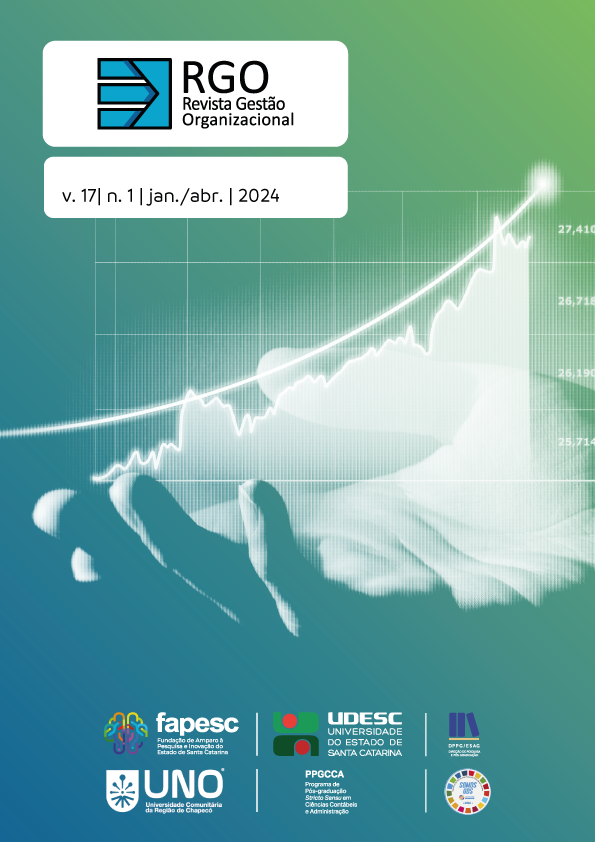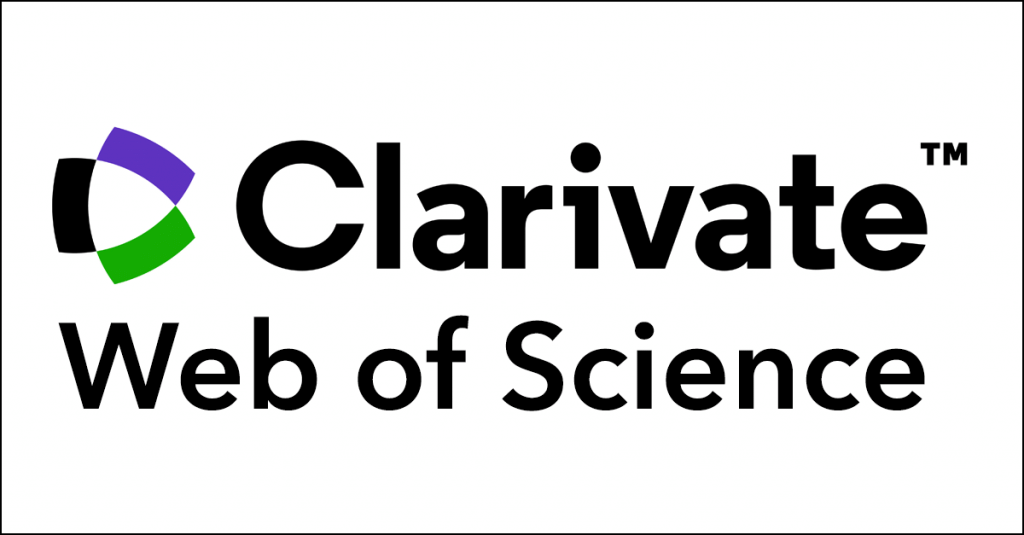UMA (AUTO)ETNOGRAFIA INTERSECTIONAL SOBRE O PRIVILÉGIO DA BRANQUITUDE NA ACADEMIA CONTÁBIL
DOI:
https://doi.org/10.22277/rgo.v17i1.7798Palavras-chave:
(Auto)etnografia, Silenciamentos, Atravessamentos, Branquitude, PermanênciasResumo
Objetivo: Compreender, a partir de uma (auto)etnografia, as experiências, ausências, presenças e permanências, silenciamentos e vozes no ambiente acadêmico, pelo estudo de atravessamentos de raça, gênero e classe social, adotando uma perspectiva interseccional e refletindo sobre o privilégio da branquitude na academia contábil.
Método/abordagem: Com abordagem qualitativa, o estudo reflete o contexto do ambiente da educação contábil no Brasil. Considera os atravessamentos de raça, gênero e classe social da primeira autora, em uma interlocução com a segunda autora. A partir da teoria interseccional, os relatos são entrelaçados pela classe social, pois esse é o marcador social em comum entre a primeira autora e as demais pessoas que tiveram suas trajetórias representadas. Vale ressaltar que os relatos foram realizados partindo do ponto de vista da primeira autora.
Principais Resultados: Os principais achados estão relacionados com a compreensão de como atravessamentos e a reflexão sobre o privilégio da branquitude podem colaborar com a permanência e com o ecoar das vozes de pessoas negras no ambiente acadêmico em contabilidade.
Contribuições teóricas/práticas/sociais: Uma das contribuições é o registro de como o privilégio da branquitude possibilitou que a primeira autora desta (auto)etnografia ocupasse algumas posições que naturalmente pessoas negras teriam maior dificuldade para alcançar, quando conseguem. Assim, houve uma reflexão sobre como esse privilégio pode ser acionado para quebrar, talvez, o pacto narcísico da branquitude e contribuir para a possibilidade de permanência das pessoas negras no ambiente acadêmico.
Originalidade/relevância: A originalidade desta pesquisa está em questionar os privilégios da branquitude e em refletir como pessoas brancas, de grupos hegemônicos, podem colaborar para a permanência e para que mais vozes possam ecoar no ambiente acadêmico contábil. A relevância se relaciona ao fato de não encontrarmos estudos em contabilidade no Brasil que tratem da questão de classe social, questão-chave em um país que está entre os mais desiguais do mundo, alinhada com reflexões sobre a branquitude.
Downloads
Referências
Akotirene, C. (2018). O que é Interseccionalidade? Feminismos Plurais. Grupo Letramento.
Almeida, S. (2019). Racismo estrutural. Pólen Produção Editorial.
Amaral, M.F.S. (2013). O movimento de (des)silenciamento em aula de língua portuguesa na rede estadual. Mestrado em Linguística Aplicada e Estudos da Linguagem. 2013. p. 174.
Bento, C. (2022). Pacto da Branquitude. Companhia das Letras.
Bento, M. A. S. (2006). Raça e gênero no Mercado de trabalho. In M. I. B. da Rocha (Org.), Trabalho e gênero. Editora 34.
Blay, E. A. (2004). Mulheres na USP: horizontes que se abrem. Editora Humanitas.
Brito, H., & Ornat, M. J. (2021). Posicionalidade: teoria e prática geográfica nas epistemologias Pós-coloniais, Feministas e Queer. 7. Colóquio Mulher e Sociedade. 28 a 30 de junho de 2021. http://177.101.17.52/jornalismo/ocs/index.php/7coloquiomulheresociedade/7coloquiomulheresociedade/paper/viewFile/312/89
Cardoso, L. (2010). Branquitude acrítica e crítica: A supremacia racial e o branco anti-racista. Revista Latinoamericana de Ciencias Sociales, Niñez y Juventud, 8 (1), 607-630. https://www.redalyc.org/articulo.oa?id=77315079028.
De Jesus, C. M. (2012). Branquitude x branquidade: uma análise conceitual do ser branco. UFRB. https://www2.ufrb.edu.br/ebecult/wp-content/uploads/2012/05/Branquitude-x-branquidade-uma-ana-%C3%83%C3%85lise-conceitual-do-ser-branco-.pdf
Dourado, J. R. S. (2013). Índice de sustentabilidade empresarial: uma certificação ou mudança de paradigma? Estudo de caso da BM&FBOVESPA. 135 f. Dissertação (Mestrado em Administração) - Pontifícia Universidade Católica de São Paulo, São Paulo.
Dourado, J. R. S. (2018). Competências da sustentabilidade na atuação profissional de egressos do Centro Paula Souza - Um estudo de caso. 181 f. Tese (Doutorado em Administração) - Pontifícia Universidade Católica de São Paulo, São Paulo.
Evaristo, C. (2017). Poemas da recordação e outros movimentos. 3. ed. Rio de Janeiro: Malê.
Evaristo, C. (2020). A escrevivência e seus subtextos. In C. L. Duarte & I. R. Nunes (Eds.), Escrevivência: a escrita de nós: reflexões sobre a obra de Conceição Evaristo (pp. 26-46). Rio de Janeiro: Mina Comunicação e Arte.
Frankenberg, R. (2004). A miragem de uma branquidade não marcada. Garamond.
Frankenberg, R. (1993). White Women, Race Matters: The Social Construction of Whiteness. University Avenue Southeast, Minneapolis, MN 55455–3092.
Geledés – Portal (2011). (s.d.). LEIS 10639/03 e 11645/08 NO IFRJ – RELATÓRIO. https://www.geledes.org.br/leis-1063903-e-1164508-no-ifrj-relatorio.
Haynes, K. (2006). Linking narrative and identity construction: using autobiography in accounting research. Critical Perspectives on Accounting, 17(4), 399–418. 10.1016/j.cpa.2004.08.005.
Houaiss, Dicionário. Significado de atravessamento. https://houaiss.uol.com.br/corporativo/apps/uol_www/v6-1/html/index.php#0.
IBGE - Instituto Brasileiro de Geografia e Estatística. (2017). História. https://cidades.ibge.gov.br/brasil/mg/carmo-da-mata/historico.
Lima, J. P. R. de, Carmo, L. M. do, & Casa Nova, S. P. de C. (2020). “As aves, que aqui gorjeiam, não gorjeiam como lá?”: uma autoetnografia na pandemia a partir de um triálogo entre sul e norte no olhar do sul. In Anais. São Paulo: EAC/FEA/USP. https://congressousp.fipecafi.org/anais/Anais2020/ArtigosDownload/3037.pdf
Lionnet, F. (1991). Autobiographical voices: race, gender, self-portraiture. In R. G. Adams, T. E. Ellis, & C. Jones (Eds.), Handbook of autoethnography (pp. 736). Left Coast Press.
Moreira, A. (2019). Racismo recreativo. Pólen Produção Editorial.
Nóbrega-Therrien, S. M., de Oliveira Menezes, E. A., & Therrien, J. (2015). A reflexividade como busca de sentidos e significados: contribuição na formação dos saberes docentes. Educação em foco, 18(25), 171-199.
Pinheiro, B. C. S. (2023). Como ser um educador antirracista. Editora Planeta.
Ribeiro, D. (2019). Lugar de fala. Pólen Produção Editorial Ltda.
Sampaio, S. M. (2010). A Psicologia na educação superior: ausências e percalços. Em Aberto, 23(83).
Santos, S. M. A. (2017). O método da autoetnografia na pesquisa sociológica: atores, perspectivas e desafios. Plural - Revista de Ciências Sociais, 24(1), 214-241.
Schucman, L. V. (2020). Entre o encardido, o branco e o branquíssimo. Editora Veneta.
Silva, W. A. (2015). Foucault e indigenciação–as formas de silenciamento e invisibilização dos sujeitos. Problemata: Revista Internacional de Filosofía, 6(3), 111-128. https://periodicos.ufpb.br/ojs/index.php/problemata/article/view/24016/14346.
Soares, L. V., & Machado, P. S. (2017). "Escrevivências" como ferramenta metodológica na produção de conhecimento em Psicologia Social. Revista Psicologia Política, 17(39), 203-219.
UNEafro. (2023). União de Núcleos de Educação Popular para Negras/os e Classe Trabalhadora. História. Disponível em https://uneafrobrasil.org/historia/
Werneck, J. (2016). Racismo institucional e saúde da população negra. Saúde e sociedade, 25, 535-549.
York, S. W., Oliveira, M. R. G., & Benevides, B. (2020). Manifestações textuais (insubmissas) travesti. Revista Estudos Feministas, 28(3), e75614. https://doi.org/10.1590/1806-9584-2020v28n375614
Downloads
Publicado
Como Citar
Edição
Seção
Licença
Estou ciente de que, em sendo aprovado, a publicação do artigo será no formato on-line na RGO.
Também tenho ciência de que há autorização para assumir contratos adicionais separadamente, para distribuição não-exclusiva da versão do trabalho publicada nesta revista (ex.: publicar em repositório institucional ou como capítulo de livro), com reconhecimento de autoria e publicação inicial nesta revista.
Do ponto de vista do Creative Commons, a Revista Gestão Organizacional é de acesso aberto e irrestrito, porém não permitindo adaptações nos artigos, nem o uso comercial.
Sobre a licença Creative Commons: As licenças e instrumentos de direito de autor e de direitos conexos da Creative Commons forjam um equilíbrio no seio do ambiente tradicional “todos os direitos reservados” criado pelas legislações de direito de autor e de direitos conexos. Os nossos instrumentos fornecem a todos, desde criadores individuais até grandes empresas, uma forma padronizada de atribuir autorizações de direito de autor e de direitos conexos aos seus trabalhos criativos. Em conjunto, estes instrumentos e os seus utilizadores formam um corpo vasto e em crescimento de bens comuns digitais, um repositório de conteúdos que podem ser copiados, distribuídos, editados, remixados e utilizados para criar outros trabalhos, sempre dentro dos limites da legislação de direito de autor e de direitos conexos.
A Revista Gestão Organizacional adota o sistema: Atribuição-SemDerivações-SemDerivados CC BY-NC-ND: Permite o download dos seus trabalhos e o compartilhemento desde que atribuam crédito, mas sem que possam alterá-los de nenhuma forma ou utilizá-los para fins comerciais.























